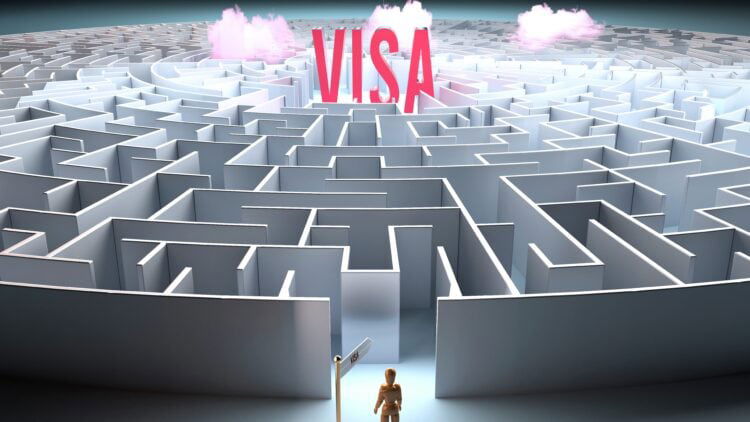Visa rules need an overhaul to facilitate global co-operation in a runaway world, Ankita Anand writes.

Each time I go to Europe for work, I am riddled with anxiety over the visa procedure. Fortunately, I have never been denied entry. On one occasion though I received the visa so late that I missed most of my conference and lost money over flight tickets—one of the prerequisites for a visa application.
Visa hurdles are not an individual but a systemic issue, and one the majority world has been grappling with for years. I am primarily referring to business visas or work trips where people are invited for workshops, conferences and fellowships for a relatively short period.
The nervousness among applicants remains even when they have ticked all the boxes. Not only must they own a passport, whose validity extends much beyond the time of travel, and submit the application fee. They must also book the tickets and have the stipulated amount in a bank account—as well as travel insurance, an invitation letter, accommodation details and proof of having filed tax returns and obtained vaccinations.
Overwhelming procedure
The application process thus itself becomes a barrier. In an article for the Migration Policy Centre, Ettore Recchi and Emanuel Deutschmann cite datasets gathered by the Global Mobilities Project:
Overall, there is a strong negative relation between tourist-visa costs and sender-country Gross National Income per capita. People in Southern Asia pay on average in excess of three times more than Western Europeans when getting a visa to go abroad … those who have already an advantage (being from a more developed country) get an additional advantage (in terms of cheaper visas).
Of course, this processing fee is not refunded, regardless of whether the visa request is approved or denied. Earlier this month there was also a 12 per cent hike in the visa fee for access to the Schengen area in Europe. And since the procedure can be overwhelming, some hire agents to ensure they have got everything right—inevitably incurring additional costs.
A Schengen visa allows entry into all 29 states party to the agreement (which is not of course the whole of geographical Europe). But forms and requirements can still vary. If one has applied to a particular country, one may not know exactly what to do when it comes to the next. For instance, almost every time I go for a visa I have to be photographed anew, because the photos I had taken for the last country do not seem to work for this one.
At times too, there seems to be internal confusion and lack of communication among embassies. To travel to Montenegro, I had a number of meetings with the consulate vetting my documents. Then, just a few days before the trip, I was told I would have to go through the Serbian embassy to have my passport stamped—I panicked but was able to rush through the process successfully.
Stuck at the border
One would think, after all the trials and tribulations, that finally getting a visa would be something of a salve for the soul. But the palpitations remain until one has crossed all the borders. In an article for the International Journalists’ Network, Milo Milfort wrote: ‘Even after receiving a visa, African journalists are subject to more passport control measures that can often be discriminatory.’
I have found myself stuck at a border when travelling back from Europe. I was there for a work retreat and my considerate organisation had made sure to choose a place with fewer visa complications. I had spent most of my time before the trip constantly checking all the rules and regulations. I had tried to glean information from tour agencies and friends. Yet, despite all the preparation, I was still stopped.
Thanks to my supportive organisation, I could purchase a new ticket and fly through another country. But I would not wish to relive the hours I spent working out a solution, looking for a counter where I could share the problem, asking for redress or suggestions—and finding none.
Emotional toll
The toll is not just material but emotional too: having to prove one has no desire to settle in the destination country or that one has enough money to survive in Europe can feel like humiliation. An applicant interviewed by the New York Times said: ‘I am going on an invitation and they want to see my monthly bank statements? … They want to be sure that I’m not illegally immigrating there, just because I’m Turkish. It feels kind of strange, and humiliating, to [be] ask[ed] how much money do you make.’
A lot of people have spoken openly about hassles such as these. Yet many more would be reluctant to do so, out of fear of being penalised by denial of a visa.
And not only ‘outsiders’ have to face this obstacle race. Omid Ebrahimi, who is a Norwegian citizen, wrote about his experience of applying for a visa to present at a scientific conference: ‘My colleague, a native Norwegian, finished the portal rapidly and paid a $20 fee, and their visa requirement was waived … I was born in Iran, and my experience couldn’t have been more different.’ Indeed, after a long and arduous process, he was denied a visa.
Not the only continent
In ‘Western visas, the nightmare of global African academics’, Dr Peter Waiswa wrote: ‘What the “developed world” is missing, however, is that the academics whose travel is being made difficult are substantially contributing to the discovery of solutions and innovations to the current global challenges in this supposed global village that we are occupying, making them global citizens.’ Europe is not the only continent in this global village.
Travelling to Africa has been easier for me. I have many colleagues there and would love to be able to work with them more closely. Yet owing to the uneven global wealth distribution, Europe is in a position to sponsor more opportunities than Africa or Asia. It is thus in Europe that I end up meeting colleagues from those regions as well.
Travelling on more equitable terms would foster mutual transfer of knowledge and experiences. A world suffering from extreme conditions—be these due to climate, economics or war—is also a world of lopsided power and exclusive perspectives. (And yes, that some majority-world countries disallow foreign journalists from crossing their borders and covering issues that deserve international attention also reeks of insecurity.) Every arena, from policy to literature, benefits from transnational engagement.
There has been talk in the European Parliament about an online visa process and digital visas. In the case of Indian nationals, a regular traveller can now apply for two-year and five-year visas. If these changes become practical realities, and for all of the majority world, it could be one step towards creating a level global playing-field.
This is a joint publication by Social Europe and IPS-Journal

